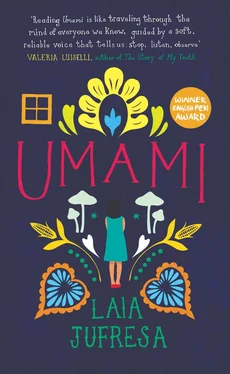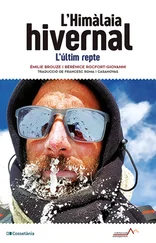A few months ago, the Neighborhood Association got hold of several liters of a horrible rosy red paint that the hardware store on the nearby avenue was selling off cheap. It was Marina’s fault: she’s obsessed with colors, particularly their names, so she chose it because the tins said Coral. I guess she thought coral would bring her closer to her marine-a habitat or something. We all had to take turns painting. Even my mom came out of her little bubble to paint for a while. Now, if you happen to be walking along the street when someone opens the door to the mews, it looks like you’re peering down a larynx: like the long passageway is made of a living tissue, and the dew-like sunlight dappled across the textured walls is saliva.
Marina opens the door to me in jeans and a white blouse. I reckon I’ve spent more time observing her style than any other fashion trend. I don’t really get it, but I love it. When she first came to the mews, Marina babysat us while Mom grieved for Luz. She would make us sit down with the instruments in Sweet House, where my parents have their music school, and we would spend whole afternoons drawing and painting. It was boring as hell, but from the window we could spy on the cortège of women processing through the mews to visit Mom. Slowly and deliberately, they’d file along the corridor, which was purplish back then, a shade Marina used to call ‘asylilac’. And that’s what they looked like, the women; a line of loony asylum runaways, always on edge, in a rush, fresh out of a traffic jam or just stopping by between errands. Some would spot us through the window and pop into the school to deliver death-grip hugs. Then they made their way over to our house, and if they were lucky Mom would drink wine and tea with them, in which case they’d leave all serene, my sister’s death like a pill that put their own mini-dramas into perspective. Other days, she wouldn’t even open the door to them, so the deeply distressed cortège would come back to Sweet House, and we’d have to make excuses for Mom.
‘She’s at a rehearsal,’ we’d say. And sometimes she really was.
‘What about your dad?’ the women would insist.
And I’d tell them the truth, which amounted to the same thing: ‘Rehearsal. He has a concert coming up.’
Sometimes it feels like they spent that entire first year locked away in a permanent rehearsal while we sat among the untouched instruments in their silent music school, the hallway piling up with gift baskets. Something I understood then is that the Mexican gift industry may be well and truly gringofied at Christmas, but when it comes to death, our own comfort foods trump everything. I’ve never received so many bags of Mexican sweet treats — pepitorias, palanquetas, jamoncillos — as I did when my sister died. I found it dumb and pretty insulting, them bringing us candies. Not that that stopped me eating them. My mom and Marina also used to meet up for wine or tea, until last year when they stopped talking to each other. I never found out why. When I ask Mom she says Marina’s a traitor, or that she sided with the enemy or something along those lines. But the last time I tried to get her to dish the dirt she stood there thinking for a while and then said, ‘Because I’m like Corleone, you better don’t mess with my people, or…’
‘Or…?’ I asked, but she just stuck out her tongue at me.
I don’t dare ask Marina what went on, but once she let it slip that she thinks Mom is ‘rancorous’. She also said it’s ‘pathological’ that she’s still mourning, and that she lives ‘shut out from the world’. But she doesn’t, really. Mom still rehearses and she’s gone back to teaching in Sweet, and if we put on a play or show at school she always comes. She doesn’t play in concerts anymore, though.
‘So why rehearse?’ people ask her.
‘Because it keeps my head above water,’ she answers, as if the lifeline music throws her were material and evident: a big, fat buoy at the base of the cello, keeping her from slipping under. As if we weren’t all wading in the river of shit that Luz’s death left in our home. Except that it’s not even quite a river, our sadness: it’s stagnant water. Since Luz drowned, there’s always something drowning at home. Not everyday. Some days you think that we’re all alive again, the five remaining members of the family: I get a zit; some girl calls Theo; Olmo plays his first concert; Dad comes back from tour; Mom decides to bake a pie. But later you go into the kitchen, and there’s the pie, still raw on the wooden countertop, half of it pricked and the other half untouched, with Mom hovering over it, clutching the fork in midair. And then you know that we too, as a family, will always be ‘almost six’.
*
Marina greets me like she greets everyone: by grabbing you by the back of your head and planting a kiss on your cheek (and if you don’t know her, and if you’re as dumb as my brothers, you might think she’s going in for the mouth). From this angle, I can see her black bra. Maybe I need me one of those. Thirteen is definitely the age for one’s first black brassiere. It’s too embarrassing if Dad takes me, but maybe Pi will want to come along when she gets back. I go into Bitter. It’s always a surprise when you step through the door. Firstly, because it’s different every time, and then because there’s something over-the-top about it. Something bubbly. The décor consists of piles of cushions on a chicken-yellow sofa, the only constant in the whole place. Some of the cushions have tiny little mirrors that twinkle depending on where you stand. Marina donated me some cushion covers, which now take pride of place on my chaise longue. I filled them with plastic bags, just like she showed me. Luz would say Marina is the queen of recycling. She gets all those clothes I like second-hand. With her hands on her hips she says, ‘Yes, miss?’
Before they clashed, my mom used to teach Marina English. She tried to teach Dad too, back when they met, but his pronunciation still sucks. According to him, on principle you should distrust any language that uses the same word for libre and gratis . When he’s around she speaks to us kids in Spanish. He says she doesn’t want us to turn out like foreigners, which is exactly what we are. Or, at least, we have two passports. Even Luz had an American passport. She’s a baby in the photo, just a few months old. Mom is holding her in her arms and Luz looks serious, sort of startled, as if even then my sister foresaw the gravity of the trip she would come to take. Four by five centimeters of portentous ID.
*
The only thing I tell Marina is that I designed a garden. I don’t feel like explaining that my parents still feel the need to send me to the epicenter of the tragedy each year to wallow in seaweed and memories under the now obsessively watchful eye of Emma, and that to avoid going, I had to make up some form of tangible compensation. She wouldn’t appreciate the word milpa either: too native for her liking. Design, on the other hand, is one hundred percent her thing, I think.
‘And now I’m actually ready to build it, so I need tools,’ I go on.
But before I’ve even finished my sentence I realize how absurd my request is. The most useful thing I’m likely to find among all this velvet is a spoon. And if there is a spoon then it’s probably from the cutlery set my mom gave her the day she discovered Marina ate exclusively out of recycled yogurt pots.
Marina puts her hands on her hips, raises her elbows and curves her spine, her breastbone backing away from me. Her collarbones stick out. She always does this when she’s thinking. She looks like a mandolin. Then, quick as a flash, she straightens up again and leaves the room. I don’t know what this means, but I stay put. There’s a new lampshade above my head. It’s made of a series of solid, sheer droplets which hang in semicircles around the bulb, like a ghostly spider. The correct word would be ‘ethereal’. It must be made of plastic because Marina doesn’t use glass. My mom explained that this is because Marina saw her father break a glass of wine with his teeth when she was a little girl. It gives me goosebumps just imagining it. In fact, when I want goosebumps I think of exactly that: my mom calmly biting her wine glass and chewing on it.
Читать дальше












